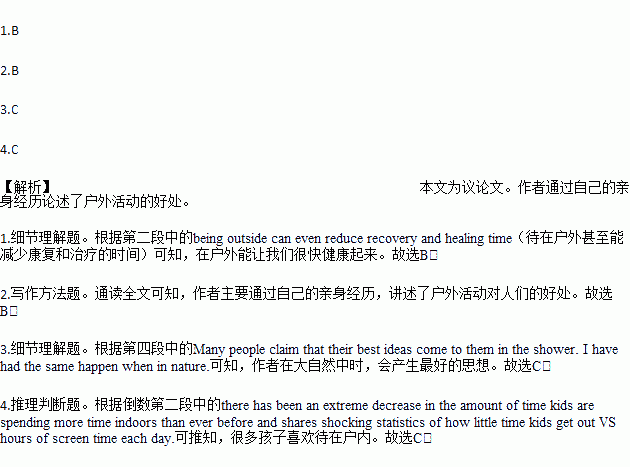题目内容
As confusion disappeared, we found freedom, time, and energy to do more of what we love. We started hiking more and added weekend and weeklong camping trips. In doing so,we realized more and more benefits of being outdoors.
The physical health benefits from being outside may be pretty obvious at first, but there are more than I realized. Studies have shown that besides the vitamin D intake, being outside can even reduce recovery and healing time. Activity outdoors can also have a higher fitness benefit than exercise done indoors.
A walk in the woods or even just a quick trip to a park can help reduce anxiety, improve short-term memory and reduce mental tiredness. Any time I need a boost in my mood, spending even five minutes in the sunshine will help. Imagine the benefits we receive from spending an entire day or even more outdoors.
As I’ve made it my preference to be outdoors, I find myself inspired and excited about life. Many people claim that their best ideas come to them in the shower. I have had the same happen when in nature. My creativity, confidence, and focus all increase after a hike or a weekend spent camping.
In between my my generation and the generation of my children, there has been an extreme decrease in the amount of time kids are spending more time indoors than ever before and shares shocking statistics of how little time kids get out VS hours of screen time each day. This has given rise to many negative consequences such as poorer physical and mental health.
However, as mentioned previously, all the benefits we as adults can receive from time spent outdoors, it is even better for our kids. It is clear that time in nature is good for both adults and children.
1.According to the passage, we can know that .
A. it is necessary to take in more vitamin D
B. being outside helps us get well sooner
C. indoor exercise is kind of harmful to health
D. keeping fit is very important for children
2.How does the author give advice to readers?
A. By making comparisons.
B. By presenting his personal experience.
C. By giving warnings.
D. By following the order of importance.
3.When does the author have his best ideas?
A. When he is having a shower.
B. When he is with the kids.
C. When he is in nature.
D. When he comes back from work.
4.What can we infer from the passage?
A. The author is an expert in physical health.
B. The author is strict with his children.
C. Many children still prefer to stay indoors.
D. Most parents ignore the value of being outdoors.
| A. | make | B. | makes | C. | would make | D. | made |
-Not really.Actually I slept through his speech.( )
| A. | adapted to | B. | took up | C. | broke down | D. | appealed to |
| A. | Limit | B. | lack | C. | need | D. | demand |
| A. | Regardless of | B. | Apart from | C. | Instead of | D. | Due to |

